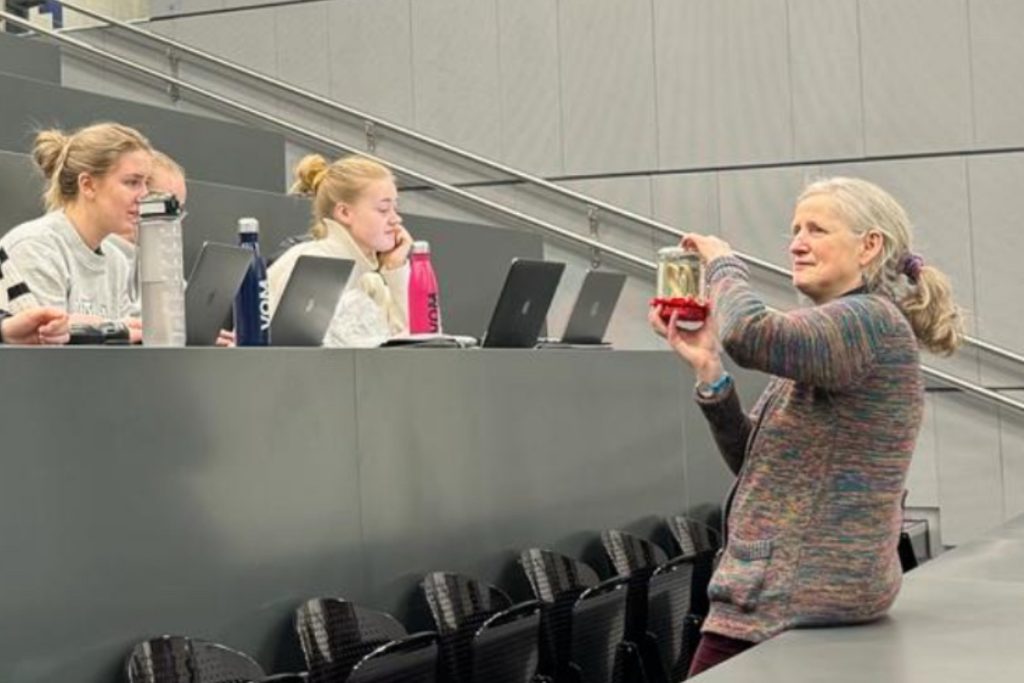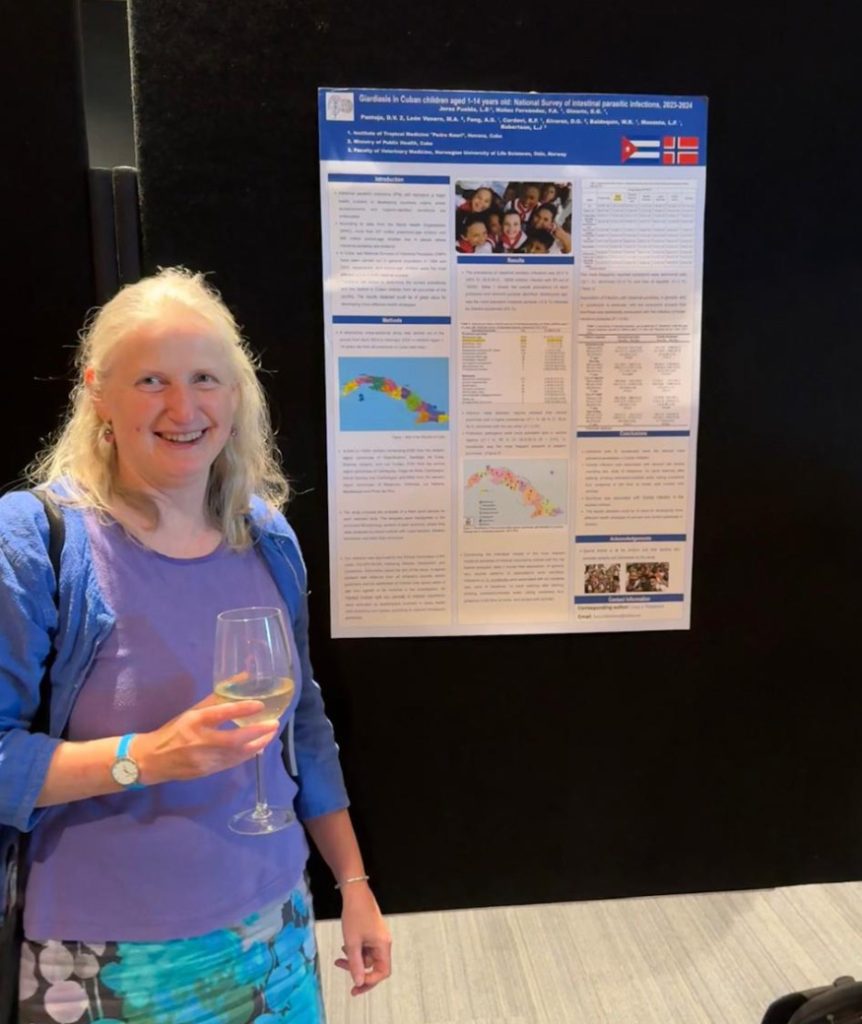The recent SAPEA report “One Health governance in the EU” defines the “One Health”-concept as an integrated approach to optimize the health of humans, animals, and ecosystems, emphasizing their interdependence – how it’s all connected. Nominated by Academia Europaea Bergen, parasitologist Lucy Robertson participated in the working group for the report.

Lucy Robertson, teaching at the Norwegian University of Life Sciences, and has been a member of the working group for the report SAPEA report “One Health governance in the EU”.
In this interview, Lucy Robertson explains many aspects both of the “One Health”-concept and of how the SAPEA report can advance the One Health thinking. The report addresses governance, operationalization, and evaluation of One Health policies, offering evidence-based recommendations for implementation.
– What do you see as the most important gains in adopting a “One Health” approach for society?
– It is clear to me that use of a One Health approach is essential for not only tackling disease in people (both infectious and non-infectious), but to ensure that we have a planet that is liveable for future generations. The unescapable fact that changes we make to our environment affects animal and human health, means that the approach of only addressing problems when they arise, and not realising that even mitigation of an apparently urgent problem may result in negative consequences, is being increasingly recognised as non-sustainable.
– Instead of the “detect problem then deal with problem” chain of events, we have the means to collaborate and consider the more strategic “anticipate problem then avoid problem” approach. This can only be good for society.
– In what ways did your background as a researcher contribute to your interest in the «One Health» concept?
– I am a parasitologist, and parasites are one of the pathogen groups that are often associated with zoonotic (animal-to-human) transmission. After my PhD, which focussed largely on intestinal parasites in school children in Panama, I continued my career in parasitology in a general hospital in Scotland with particular focus on Cryptosporidium, a parasite that is zoonotic and often transmitted via contamination of the environment, such as water and food.
– Moving to Norway, I began working in the Norwegian Veterinary College, but on the same sort of topics, but this time with more focus on the animal side. So, for many years I have been very much aware of the importance of being aware that animals-humans-environment are best considered not in silos, but as a whole system, in which one part affects, and is affected by, the other parts. More parasites and more research later, this is still clearly the way to go. It is the basis of the One Health concept, and my research and outlook has been very much rooted in this since the 1990s (at least a decade before the “Manhattan Principles” were published). I think that many parasitologists (and others) would also consider that their work had been ground in One Health, long before it became a written concept.
– What are the origins of the «One Health» concept?
– This is not a “new” idea at all. The German physician, Rudolf Virchow (1812-1902), is considered the founder of social medicine and veterinary pathology. He described the life cycle of the parasite Trichinella spiralis and later discovered that cooking meat before consumption was an effective mean to prevent infection. His insights are clearly within the scope of One Health, without that term having been used. In 1964, Calvin Schwabe introduced the term “One Medicine” in his book on veterinary medicine and human health.
Read or download the report here.
– A meeting in the Rockefeller University in 2004 made concrete many of the One Health principles under which many had already been working without giving the concept a formal name. This meeting was largely generated by a series of outbreaks of different diseases (West Nile Virus, SARS, BSE (“mad cow disease”) that brought home that only be considering human health, domestic animal and wildlife health could a broader understanding of disease be achieved.
– Although the health of the environment was not mentioned directly here, many examples of, for example, climate change and biodiversity recognised the importance of the environment, the ecosystem in which we all live. Since then organisations such as FAO, WOAH, and WHO have collaborated, along with UNICEF, UNSCI, and the World Bank to provide strategic frameworks fin which the One Health concept can be applied at the ecosystem- animal-human interface.
– The first One Health congress was held in 2011 in Melbourne, Australia, and now it is a concept with which many are familiar. As with such concepts, the term is frequently misused, and many work within a One Health framework, without calling it that (just “business as usual”). It is on the shoulders of all these pioneers in One Health, with only a few mentioned here, that the SAPEA group began its work.
– The working group in this SAPEA report refined the definition of the One Health concept slightly. Can you take us through the process of working on the definition of “One Health”?
– The working group all were concerned with One Health, but all had different backgrounds and areas of expertise. We started from the One Health definition provided by the One Health High-Level Expert Panel (OHHLEP) in 2022. By going through it word by word and discussing how each of us understood it, we were able to pinpoint where we felt there were ambiguities. This was particularly regarding the word “environment” and “ecosystem”, whether they are in fact synonyms, or that one encompasses the other. We ended up by defining “environment” as being a component of an ecosystem, but neither an animal nor a person.
– In what ways does the One Health concept relate to pandemic prevention and preparedness?
– Pandemic prevention and preparedness is obviously an important example of the “anticipate problem then avoid problem” approach. Previously (and repeatedly) we have waited for the pandemic “problem” to arrive and then rushed around trying to arrive and mitigate its impact. By brining in a wide spectrum of relevant people to anticipate when, where, and how a pandemic “problem” might arise, we give ourselves the chance to avoid that problem even occurring or only occurring in a controllable way.

Lucy Robertson is a professor at the Norwegian University of Life Sciences, and has been a member of the working group for the report SAPEA report “One Health governance in the EU”.
– However, I would like to emphasise that although pandemic awareness is high in the minds of many, not least due to the SARS-CoV-2 pandemic just a few years ago, there is more to One Health than pandemic awareness and prevention. This is an extreme example that frightens everyone, but there are many other One Health issues that may still make an impact on many although being of a more insidious, and less dramatic, nature.
– The SAPEA report mentions that we might see a paradigm shift on the topic of “One Health”. Do you agree and if so, how is that expressed today?
– I agree that there is already a paradigm shift within the field of One Health, in that there is a lot more emphasis on interdisciplinarity and transdisciplinarity in many aspects of tackling problems. This effort to move away from “silo thinking” is of value. The concern is that this is only very superficial, and that some partners in any multidisciplinary project may be sidelined or their impact considered of less value due to entrenchment in values from specific specialist fields. However, I think that as positive outcomes become recognised as being, at least in part, due to a One Health perspective being used, there will be a shift towards a greater understanding of the importance of this approach.
– I think that the anthropocentric framing of One Health is going to be more difficult to overcome. We are all selfish, and it is very difficult for any of us not to feel that people are of greater value than all else. As it happens, in One Health, the costs and benefits of all within the ecosystem need consideration, and recognition of the interaction may enable us to see that all One Health issues will, of their very nature, consider human aspects too. Thus, it is not putting “trees before people” but realising that aspects of both impact and effect each other.
– Are there any of the recommendations in the SAPEA report “One Health governance in the European Union” you want to highlight?
– To encourage everyone to take the One Health approach seriously, it is important to prove the value. Thus, to me, even for One Health adherents, it is important that we are held up to scrutiny and formal monitoring and evaluation is included. Methods by which we can determine the contributions from different sectors in addressing problems from a One Health perspective are important. The “Checklist for One Health Epidemiological Reporting of Evidence” may sound very dull, but enables and promotes inclusion of expertise form diverse disciplines.
– Economic analyses also sound very dry, but demonstrating that a One Health approach is more profitable than a siloed approach is very simple to understand and is convincing, also for politicians. The report from SAPEA gives many concrete examples of this, which demonstrate how important it is to be able to provide such data so that the relevance and financial benefits from using a One Health approach to tackle different issues can be realised.
